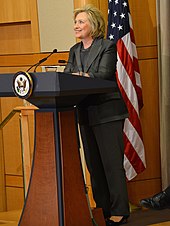Email controversy

A controversy arose in March 2015, when the State Department's inspector general revealed that Clinton had used personal email accounts on a non-government, privately maintained server exclusively—instead of email accounts maintained on federal government servers—when conducting official business during her tenure as secretary of state. Some experts, officials, members of Congress and political opponents contended that her use of private messaging system software and a private server violated State Department protocols and procedures, and federal laws and regulations governing recordkeeping requirements. The controversy occurred against the backdrop of Clinton's 2016 presidential election campaign and hearings held by the House Select Committee on Benghazi.
In a joint statement released on July 15, 2015, the inspector general of the State Department and the inspector general of the intelligence community said their review of the emails found information that was classified when sent, remained so at the time of their inspection and "never should have been transmitted via an unclassified personal system". They also stated unequivocally this classified information should never have been stored outside of secure government computer systems. Clinton had said over a period of months that she kept no classified information on the private server that she set up in her house. Government policy, reiterated in the nondisclosure agreement signed by Clinton as part of gaining her security clearance, is that sensitive information can be considered as classified even if not marked as such. After allegations were raised that some of the emails in question fell into the so-called "born classified" category, an FBI probe was initiated regarding how classified information was handled on the Clinton server. The New York Times reported in February 2016 that nearly 2,100 emails stored on Clinton's server were retroactively marked classified by the State Department. Additionally, the intelligence community's inspector general wrote Congress to say that some of the emails "contained classified State Department information when originated". In May 2016, the inspector general of the State Department criticized her use of a private email server while secretary of state, stating that she had not requested permission for this and would not have received it if she had asked.
Clinton maintained she did not send or receive any emails from her personal server that were confidential at the time they were sent. In a Democratic debate with Bernie Sanders on February 4, 2016, Clinton said, "I never sent or received any classified material—they are retroactively classifying it." On July 2, 2016, Clinton stated: "Let me repeat what I have repeated for many months now, I never received nor sent any material that was marked classified."
On July 5, 2016, the FBI concluded its investigation. In a statement, FBI director James Comey said:
110 e-mails in 52 e-mail chains have been determined by the owning agency to contain classified information at the time they were sent or received. Eight of those chains contained information that was Top Secret at the time they were sent; 36 chains contained Secret information at the time; and eight contained Confidential information, which is the lowest level of classification. Separate from those, about 2,000 additional e-mails were "up-classified" to make them Confidential; the information in those had not been classified at the time the e-mails were sent.
Out of 30,000, three emails were found to be marked as classified, although they lacked classified headers and were marked only with a small "c" in parentheses, described as "portion markings" by Comey. He also said it was possible Clinton was not "technically sophisticated" enough to understand what the three classified markings meant. The probe found Clinton used her personal email extensively while outside the United States, both sending and receiving work-related emails in the territory of sophisticated adversaries. Comey acknowledged that it was "possible that hostile actors gained access to Secretary Clinton's personal email account". He added that "although we did not find clear evidence that Secretary Clinton or her colleagues intended to violate laws governing the handling of classified information, there is evidence that they were extremely careless in their handling of very sensitive, highly classified information". Nevertheless, Comey asserted that "no reasonable prosecutor" would bring criminal charges in this case, despite the existence of "potential violations of the statutes regarding the handling of classified information". The FBI recommended that the Justice Department decline to prosecute. On July 6, 2016, U.S. Attorney General Loretta Lynch—who had met privately with Bill Clinton on June 27—confirmed that the probe into Clinton's use of private email servers would be closed without criminal charges.
On October 28, 2016, Comey notified Congress that the FBI had begun looking into newly discovered Clinton emails. Law enforcement officials said that while investigating allegedly illicit text messages from Anthony Weiner, husband of Clinton aide Huma Abedin, to a 15-year-old girl in North Carolina, they discovered emails related to Clinton's private server on a laptop computer belonging to Weiner. On November 6, Comey notified Congress that the FBI had not changed the conclusion it had reached in July. The notification was later cited by Clinton as a factor in her loss in the 2016 presidential election. The emails controversy received more media coverage than any other topic during the 2016 presidential election.
In September 2019, the State Department finished its internal review into 33,000 emails that Clinton had turned over. The investigation that began in 2016 found 588 violations of security procedures and found that Clinton's use of personal email server increased the risk of compromising State Department information. In 91 cases, the culpability of sending classified information could be attributed to 38 people, but the review concluded there was "no persuasive evidence of systemic, deliberate mishandling of classified information".
Comments
Post a Comment